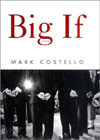When Is a Literary Debut Not a Debut?
 With its enthusiastic jacket endorsement from Jonathan Franzen ("Alive with intelligence, comedy, and inside dope ... sure-handedly captures the uncertainties of our times") and its choice as a Book-of-the-Month Club selection, Mark Costello's Big If (Norton) would seem to be the promising debut of a terrific new American writer.
With its enthusiastic jacket endorsement from Jonathan Franzen ("Alive with intelligence, comedy, and inside dope ... sure-handedly captures the uncertainties of our times") and its choice as a Book-of-the-Month Club selection, Mark Costello's Big If (Norton) would seem to be the promising debut of a terrific new American writer.
But, as it happens, Big If is in fact the second novel by Mark Costello -- though only the first to bear his name.
Costello (born and raised near Boston and now living now in New York) made his actual fiction debut six years ago as "John Flood," the pseudonymous author of Bag Men, a book the San Francisco Chronicle called "exhilarating," and Scott Turow said was "pure pleasure."
Mark Costello wrote that work -- a literary thriller about a murdered priest, ambitious prosecutors, and narcotics police in Boston in 1965 -- as John Flood in order to put some distance between his fiction and the career he was then pursuing as a federal prosecutor in New Jersey.
"I was an active prosecutor," explains Costello, "standing up in front of juries. Bag Men is a pretty tough view of prosecutors and police and dirty deeds and all that; I really didn't want it to be read as a sort of tell-all expose thing. I felt like the right thing to do by my day job was to keep some separation there. That was the idea, anyway. It may have been overly conscientious to use a pen name, but I felt it was just the right thing to do."
No longer representing the government in court (Costello now teaches at Fordham), the author felt free to put his own name on Big If.
Mark Costello had used that real name on an even earlier work: Signifying Rappers: Rap and Race in the Urban Present" (Ecco), co-written in 1990 with David Foster Wallace.
"That was written before I was a prosecutor," Costello said of Rappers, "and it was published while I was a DA (in New York)."
But (contrary to some published reports), the Mark Costello who wrote Big If and co-wrote Signifying Rappers is not the Mark Costello of Illinois, who's written many critically praised short stories.
"I know of the other Mark Costello," said the 40-year-old author of Big If, "and I admire his work. I think he's about 30 years older than I am ... He's a very good writer. I'd be pleased," he said with a laugh, "to be confused with him."
But, with the release of Big If (which Publishers Weekly judges "may well be the literary discovery of the season"), any confusion may flow in the other direction.
"It's gotten good reviews, so far," Costello acknowledged of his new novel. "And it's gotten serious reviews, which is really important to me."
Like Bag Men, Big If bears resemblance to a thriller: Some of its major characters are Secret Service agents, guarding a vice president who's running for his party's top nomination at the time of the New Hampshire primary. But Big If is just as much a mainstream novel, in a bleakly comic modern mode.
"I wanted to write a novel about tension," Costello said, "and about people under pressure; about how that is a factor in everyday life. I thought the Secret Service agents would be a great example of that, because they have to treat every boring daily event as a potentially horrific event. You know, they have to prepare for the ultimate, every single minute.
"I did want to subvert it, though, because the idea of what made the agents interesting to me was that the ultimate never happens -- or if it happens, it doesn't happen the way they expect; and they have to be ready all the time. And I thought that was in a way similar to how civilians like you and I kind of live, too: There's this kind of drone-note of pressure or tension or looking out for the unexpected -- and in the midst of that, we have to lead a daily life ...
"That's the idea behind the title: You know, the expression, 'That's a pretty big if' -- well, that's the state of our lives."
Big If is rich with real-seeming detail, some of which came from Costello's personal experience: "A couple different times I've worked in New Hampshire as a political volunteer, on the Democratic side," he said, "so I've sort of seen how these events get put together. You get advance people who come through, and political people, and then the Secret Service agents come through, and they've got a whole different kind of spooky agenda, really. So that struck me as kind of a cool metaphor.
"Big If is probably half about agents and half about civilians. You have both sides of the rope line, so to speak, and the sort of mirror image of the two kinds of things."
Though he never studied writing, Costello said there are many writers he deeply admires: "There's a very long list of writers who've influenced me, some of whom I probably don't write at all like."
Among the authors he especially likes are Lydia Davis ("a wonderful, wonderful writer"), Don DeLillo, Alice Munro, and John Berger.
"I just love their books," Costello said. "And you get motivated to write if you read something that you love." -- Tom Nolan